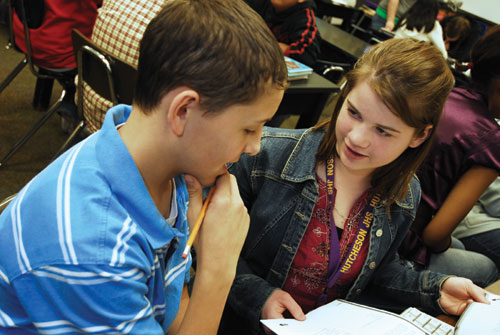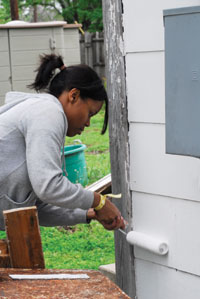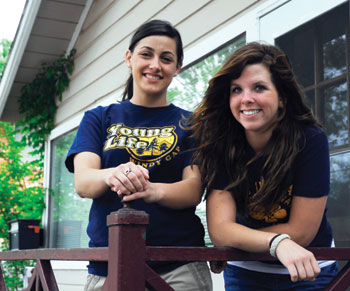FEATURE
STORIES
Learning to serve
Many UT Arlington courses require students to perform community service. For those who enroll, it can be a life-changing experience.

As part of her Exploring Teaching class, sophomore Rachel Ellison works with Hutcheson Junior High student Adnel Lozic. The service learning course requires 10 hours of mentorship, but most students do more.
It was bitterly cold that winter night in 2003 as David Stuckler sat in a warm restaurant awaiting a dinner companion. You’d expect students to meet friends for dinner in restaurants all around town, but this encounter was different. This, Stuckler reminded himself, was research.
He was preparing for a presentation to the Arlington Life Shelter board on the mental health issues of Arlington’s homeless population, and he needed to put a face on his statistics.
When his guest arrived, Stuckler pulled up a chair for George, a client at a local shelter where the young pre-med major had volunteered the last two years. George was homeless.
He was also schizophrenic and unemployed. The clothes on his back were his only possessions. He had no health insurance, no friends, nothing.
This conjured painful memories for Stuckler.
He had dropped out of high school his senior year after studying 18 months abroad. His motivation to finish school had evaporated, and going home was not easy.
He cleaned pools and picked up cigarette butts at a run-down apartment complex. He worked two jobs to make ends meet while overnighting with his Spanish-speaking maintenance co-workers.
“Paycheck to paycheck, I struggled to save nickels and dimes so I could afford my own apartment,” he said.
For a time, he lived in a tent near the San Antonio River before the cold drove him back to Fort Worth and family.
At least he had a family. Millions of others do not.
Although he never received a high school diploma, Stuckler enrolled at UT Arlington as an undergraduate Honors College student, which led to a simple service learning class.
Which changed his life.
Long after dinner on that freezing night ended and the conversation had become part of his research, Stuckler realized: “I am George.” Soon he would dedicate his life to social healing by studying social and behavioral sciences.
After moving to Yale University to work on his master’s in public health, Stuckler (’04 BS) participated in the Yale Medical School’s annual Hunger and Homeless Auction, which generated more than $20,000 for local homeless groups. He organized a candlelight vigil to raise awareness of the “social death” of an estimated 1,300 homeless people in New Haven, Conn.
He’s now working on his Ph.D. in sociology at Cambridge University in England.
Service learning is …
In service learning classes, students perform community service as part of the course work. The learning process is reinforced by discussion and journal-like essays called “reflections,” in which the students evaluate their experiences.
Unlike with an internship, the emphasis is not just on career building, but on citizenship, civic stewardship, social responsibility and academic enhancement.
“This is such a special school, where time is spent looking for ways to help others.”
– Mission Arlington Executive Director Tillie Burgin
From fall 2001 through 2004, 62 Honors College students engaged in service learning through enrollment in honors courses or as undergraduate teaching and research assistants. Representing 28 academic majors from seven colleges and schools, they performed 3,175 hours of community service for 35 agencies.
More than 500 service learning students from 31 academic disciplines performed more than 10,000 hours of community service in 2003-04. By July 2006, the number had swelled to 10,000 students, most of whom volunteered more than 20 hours per semester through their service learning classes.
Volunteers often work at Mission Arlington.
“We are always grateful for UTA and the partnership we share with the students and faculty,” said Mission Arlington Executive Director Tillie Burgin, who calls service learning the work of the soul. “This is such a special school, where time is spent looking for ways to help others. It’s not unusual for a call to come from a UTA department asking us to pick up donations, including food and money. They see the volume of people who come through our doors, so the students and faculty come to help with data entry, sorting clothes and in many other ways.”
Medicine on the mountain
In 2004, Lidia Muñoz was an Honors College senior majoring in anthropology and music when she enrolled in an anthropology internship under the supervision of Mary Ridgway, then director of the Center for Community Service Learning (CCSL).
Muñoz worked with El Centro Communitario Mexicano to expand its health service directory to include all the free health providers in the Mid-Cities. El Centro Communitario Mexicano is a nonprofit organization that helps integrate immigrants into U.S. culture while affirming their identity as Mexicans.
“I cannot imagine the real impact of this clinic for the Indian people at the mountain. This had a huge impact on my life and my academic goals.”
- alumna Lidia Muñoz on her service at a Costa Rican medical-dental clinic
“I grew up in Monterrey, Mexico, and the social reality of many underprivileged people was obvious to me,” Muñoz said. “When I came to the United States, my eyes opened to more realities, especially those of Mexican immigrants. Now I feel I’m at a point in which I can finally do something.”
In June 2003 Muñoz volunteered as a translator at a medical-dental clinic at the Cabécar Indian Reservation in Talamanca, Costa Rica. In collaboration with the Health System of Costa Rica, her church (First Baptist, Arlington) set up a free weeklong clinic in a remote part of the reservation accessible only by hiking into the mountains. She and others assisted 400 people.
“I cannot imagine the real impact of this clinic for the Indian people at the mountain,” said Muñoz, who earned bachelor’s degrees in music and anthropology. “This had a huge impact on my life and my academic goals.”
After her trip to the reservation, Muñoz decided to pursue a Ph.D. in medical anthropology.
“I’m no longer scared of people’s suffering,” she said, “and I’m not scared of sharing it with them.”

Nursing freshman April Scales paints a house during the Big Event community service day in April. In the spring semester, she enrolled in a nursing course that required 10 hours of service learning.
Projects and classes
Service learning projects run the gamut—from visiting nursing homes and making teddy bears for the Roquemore Elementary AANGELLS program, to packing toiletries for the Arlington Life Shelter and decorating pillows for children at the Salvation Army Shelter and Child Development Center.
Other projects have involved gathering leaves and empty paper rolls for animals at the Fort Worth Zoo; providing special days and supplies to disadvantaged children in Tarrant County schools; sending care packages to Brian’s House in Dallas; and laminating paper game pieces for children in danger of infection at Cook Children’s Hospital in Fort Worth.
Equally diverse are the academic disciplines represented: art, education, German, modern languages, women’s health, honors, nursing, political science, reading, social work and more.
After Sept. 11, 2001, one class gathered 5,000 letters for troops being deployed to Afghanistan. The students arranged with Dyess Air Force Base in Abilene to have the letters delivered, even though the U.S. Postal Service could not forward them.
After Hurricane Katrina, UT Arlington helped displaced students and faculty with scholarships, admissions, textbooks and housing. The Center for Community Service Learning was recognized in the President’s Higher Education Community Service Honor Roll with Distinction in two categories: general service and hurricane relief.
“Our dedication to service aligned us with other outstanding universities and speaks to our broader commitment to the community,” CCSL Director Shirley Theriot said. “Nearly 12,000 students and faculty responded to the hurricane relief requests, giving over 75,000 hours of service rebuilding homes, fund raising and providing clothing, among other projects.”
The CCSL has received more than $50,000 in grants and external funding to support faculty development, student and faculty awards, and scholarships.
As close as sisters
Imagine spending 10 hours a week volunteering as part of an anthropology class and having another part-time job at the mall, in addition to going to school full time. That kind of dedication takes faith, as one UT Arlington sophomore knows well.
Katie Parker lives and volunteers at Young Life, a nonprofit Christian outreach for junior and senior high school students. As a Young Life leader, she offers structure and support to teenage girls at Lamar High School, her alma mater.

As part of an anthropology service learning course, sophomore Katie Parker, left, mentors Lauren Arther and other girls from Lamar High School in Arlington.
“Walking into the high school lunchroom is normal for me,” she said. “I’ll pass out hamburgers, flyers or just sit down on the floor and talk to kids. Being a Young Life leader consists of becoming friends with them. I go to their practices, games, tournaments, meets, concerts and plays. I become a friend, big sister and mentor.”
One of the girls Parker mentored was Lauren “Lo” Arther, whose mother died when she was 10.
Lo was an “emo kid,” one who wore black all the time and let her hair cover her face. Last year, she wrecked her car, got a speeding ticket and began some serious partying, all within a few weeks. Then there were the inevitable tensions with her father.
“The last thing she wanted was for people to feel sorry for her because she lost her mom at such a young age,” Parker said. “For her to get emotional about it is pretty rare.”
During the time Parker has known her, Lo’s hair color went from black, to blond, to brunette, changing moods with the seasons. Within the past year, however, Lo “changed from the inside out,” Parker said. “We have grown as close as friends, maybe sisters.”
Lo is now training to become a leader for junior high students.
“I was a Young Life kid, too,” Parker said. “I earn their trust and share the love of Christ. I display my beliefs with actions. As my mentor once said, ‘Preach the gospel, preach the gospel, preach the gospel … and when necessary, use words.’
“That is exactly what we as leaders should do.”
The value of giving back
As an architecture major and Honors College student, Michael Spencer received the 2003-04 President’s Service Scholarship Award for his work with the AIDS Interfaith Network of Dallas.
The network provides spiritual and emotional uplift. Spencer volunteered in the buddy program, providing transportation and moral support.
That’s where he met Krystyn Karolinska, who had been diagnosed with HIV from a blood transfusion in the early 1980s.
“It was a time when people were not living with AIDS, but dying from it,” Spencer said. “The majority of infections were among the gay community, and many gay people were disowned by families and shunned by their churches.”
Karolinska was born in Germany and moved with her husband to America, where she attended Columbia University and later worked as a relief nurse during the early days of the AIDS epidemic. After that, she traveled throughout the United States and eventually settled in Dallas. The tribulations that followed left her widowed and disabled, but not diminished in spirit.
Despite living with the stigma of HIV, Karolinska reached out to others. One year she volunteered more than 1,300 hours in the library at the AIDS Resource Center of Dallas. She even published a book of poetry, River of Tears.
“This book is full of voices that need to be heard, and hers is honest and unique,” Spencer said. “Her stories are from someone who has adapted to living with HIV, the death of her spouse and surviving cancer, while living an ocean away from any relatives. The friends she has made in the community keep her grounded and focused on what matters most to her.”
From his buddy, Spencer learned the value of giving back.
“When I began this undertaking, I thought I might improve the way I relate to the people around me and become more sensitive to people from different walks of life. What I have found, during my time and effort in all of this, is a friend.”
Spencer volunteered many hours at H.O.P.E. Tutoring and at the AIDS Resource Center. At UT Arlington he was a McNair Scholar and received the Star-Telegram Volunteer Service Award and the University Scholar Award. He went on to complete a doctorate in architecture.
Like others impacted by their service learning experiences, he continues to serve his community.
Young poets society
Several years ago, undergraduates in English Professor Laurie Porter’s poetry class participated in a service learning project at Webb Elementary School. The students worked with supervising teachers from Webb to teach poetry writing to third-, fourth- and fifth-graders. The young students wrote more than 30 poems, and their work was compiled into a publication. From Molly, a fourth-grader:
I had a dream that Aunt Dianna came backI had a dream that Mommy had my brother
I had a dream that I saw Heather
I had a dream that I was left behind
I had a dream that my whole family died
I had a dream that I never was able to climb
I had a dream that everything was not right
I had a dream that Mommy and Daddy got in a fight
I had a dream that everything was better
— Shawn Stewart
Other Stories
Partners in discovery
Quality Enhancement Plan's pilot projects to launch this fall
Mavericks Personified: Willie Hernandez
Former Movin' Mavs star shoots for success in the wheelchair industry
Learning to serve
Many UT Arlington courses require students to perform community service. For those who enroll, it can be a life-changing experience.
Education, family style
Using their UT Arlington degrees as a foundation, the Ponce siblings fashioned successful careers in law, teaching, computing, engineering and journalism.
Morrow selected to lead women's basketball program
Contact Us
Office of University Publications
502 S. Cooper St.279 Fine Arts Building
Box 19647
Arlington, TX 76019-0647
